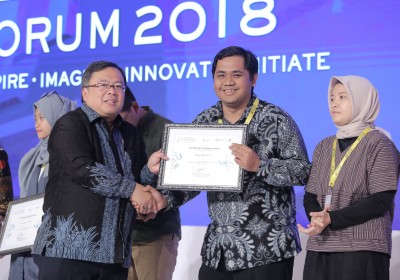Best Paper: Technologically illiterate business owners encouraged to use fintech
October 22, 2018
Small medium enterprises (SMEs) can advance their business by using financial technology (fintech) despite the limited internet connection, the lack of smart phones and technology skills.
Fintech holds massive potential for Indonesian businesses given the high penetration of internet, which reaches 140 million, with 93 percent of internet users using smart phones or gadgets. However, fintech has yet to attract many users. Bank Indonesia revealed in 2013 that cash remained the most frequently used retail payment instrument. Cash was used in 99.4 percent of all transactions. Unlike cash, fintech provides safer, faster, and more practical payment system. It also ensures transparency and broad coverage service, making it a perfect payment choice for the SMEs.
Researcher of the Economic Research Center of the Indonesian Institute of Sciences (LIPI), Nika Pranata, researched about the use of fintech in West Nusa Tenggara and Bali, two regions with tourism industry as the backbone of their economy. In his paper, that was chosen to be one of the best papers Indonesia Development Forum 2018, Nika interviewed 46 respondents who used fintech in their business.
In West Lombok, West Nusa Tenggara, a cooperative named Wira Singa introduced “E-Cash” fintech to its members, who mostly are farmers and people who own small business. Even though the members do not have smart phones and good internet connection, they still can use E-Cash for their transactions. The use of fintech has brought positive impacts to the business of Wira Singa members.
Firstly, the sale and purchase process in the cooperative is faster with fintech. Secondly, the technology has helped the members make better financial reports. Thirdly, the cooperative has received more income because it gets a commission of Rp 1,000 each time a transaction is made by a member.
Meanwhile, a startup named Small Medium Enterprise Sale System (SMESS) in Bali provides fintech system to Chinese tourists. SMESS, an online cashier system, has been used by around 100 SMEs in Bali comprising hotels, restaurants and shops. SMESS is connected with Wechat pay, so Chinese tourists can easily buy stuff from outlets that use SMESS and finish the payment on the system.
The use of SMESS has brought benefits, not only for business owners, but also Chinese tourists. The tourists do not need to spend a lot of cash to shop in Bali. They also can find outlets that use SMESS easily by checking on the application. Business owners receive more income as they receive a bonus of 1 percent at the end of each month, from every transaction made by using SMESS.
Failure because of insecurities
The use of E-Cash in Wira Singa cooperative shows that fintech can be inclusive and empower those who live in geographically-challenged areas and do not have technology skills. Without smart phones, good internet connection and technology skills, members of the cooperative can enjoy good quality payment system with E-Cash. In Bali, the use of SMESS and Wechat pay also shows digital payment has brought positive impacts to the SMEs.
However, the adoption of digital payment is still hampered by, among others, the residents’ concerns on the safety of the system. Some of Wira Singa cooperative members still hesitate about the safety of E-Cash. As a result, the cooperative organizers shall also provide manual transaction records to make the members comfortable. Making manual reports requires time, thus it is not in line with the efficiency principle introduced by the digital payment platform.
The members also feel burdened with the short message (SMS) fee they have to spend while completing the transaction process. Bad internet and cellular connection sometimes make their transactions delayed. Those factors make them prefer using cash to fintech despite knowing the benefits of the digital payment.
The government needs to make breakthrough in solving technical and non-technical issues which hamper the development of fintech in the country. Firstly, the government shall work together with local financial authorities that understand about the cultures and characteristics of the people. Secondly, the government shall also speed up the digital payment penetration and financial inclusion by giving special mandate to digital payment providers, which services have been widely used in the country.
One of the examples is T-Cash, managed by mobile operator company PT Telekomunikasi Seluler (Telkomsel), a red-plate company with the highest number of consumers in Indonesia. The company can support the implementation of government’s programs, such as the Hopeful Family Program, by distributing social aids through its digital payment platform.
Thirdly, the local government shall work together with fintech companies to give technical guidance regarding the digital payment to the SMEs. Fourthly, E-Cash needs to partner with cellular operators to reduce or remove SMS fees that have to be spent by users while completing their transactions. Fifthly, transfer and administration fees, which shall be paid by the SMEs during the top-up process, shall also be reduced or removed.
Sixthly, the government and digital financial authority shall educate and disseminate information about the concept and benefits of fintech to SMEs. The government shall also ensure a competitive digital payment climate. The competitive climate has made fintech in China grows significantly, making the country the most successful fintech hub in the world (DBS and EY 2016, Yang 2017). Lastly, fintech companies shall give more promotions and interesting offers to attract SMEs to use digital payment platform. **
Indonesia’s Research Institutions Supporting the Development of the Electric Vehicle Industry
Indonesian Muslim Fashion and Cosmetics IKMs Shine at Dubai World Expo 2020
Govt Steps Up UMKM Transformation Efforts in the Midst of Pandemic Slowdown
Govt Encourages Promotion of IKM Products in Digital Era
Government Begins Developing Maritime Training Center in Makassar
Tweets by IDDevForum
